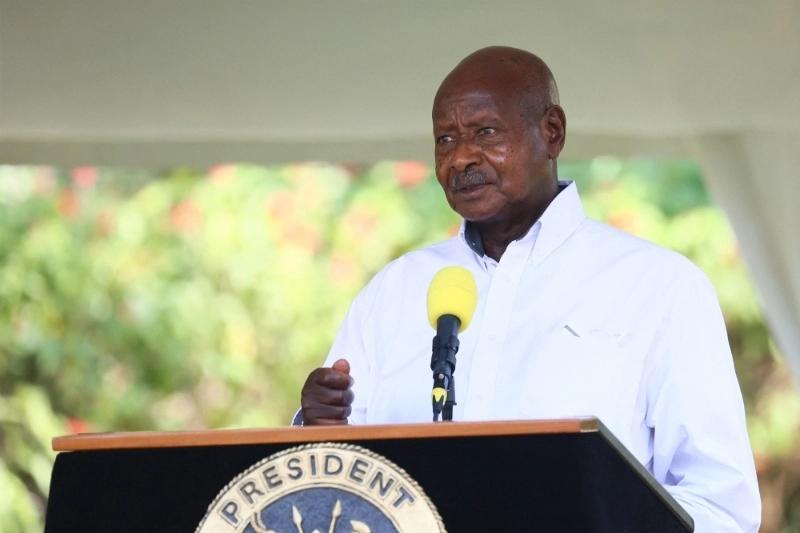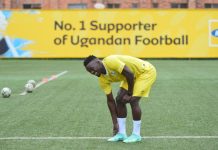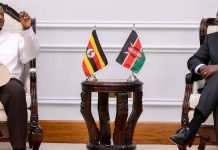By Faridah N Kulumba
Africa-Press – Uganda. The President of Uganda Yoweri Kaguta Museveni while addressing the Uganda Oil and Gas Summit held in Kampala, sustained his trade against the September 15th European Parliament’s proposal for the planned East African Crude Oil Pipeline (EACOP) project.
Museveni’s reasons for Protesting
President Museveni called those who are opposing the EACOP project insufferable. He advised them to control themselves in order not to explode. According to Mr. Museveni, those who are sanctioning the project are so shallow, so egocentric, and so wrong but they think they are knowledgeable about everything. He publicly criticized the West and vowed to ensure the project goes ahead as scheduled.
Political backing
President Museveni also defended the environmental soundness of the project, saying it would be conducted within the law. His statement was the latest assurance that the pipeline project between Uganda and Tanzania still has political backing despite facing challenges from environmental activists and financing uncertainty.
Background
On 11th April 2021, the President of Uganda Yoweri Kaguta Museveni, and the President of Tanzania Samia Suluhu Hassan signed the agreement to build an oil pipeline that will ship crude oil from fields in Western Uganda to the international market. The two countries together with the French oil giant Total and CNOOC signed a deal worth USD3.5 billion for the construction of the pipeline which would be the world’s longest at 897 miles.
The final agreement was signed on 1st February 2022, when Chines and French oil giants sealed a USD10 billion deal to unlock Uganda’s energy resources and build a vast regional pipeline, a mega-project that has incensed environmental groups.
The final investment decision was to pave the way for the export of millions of barrels of black gold that was first discovered in 2006 in Uganda, one of the world’s most biodiverse regions. Lake Albert lies atop an estimated 6.5 billion barrels of crude oil, of which about 1,4 billion barrels are currently considered recoverable
According to the project schedule, the oil companies have three years to deliver the first barrel of oil in April 2025.
EU concerns
In mid-September this year the European Parliament criticized a proposed East African pipeline, calling for TotalEnergies to consider an alternative route. European Parliament was reacting to the grave concern around alleged human rights violations in Uganda and Tanzania, linked to the Lake Albert project. The plan covers upstream investments in Tilenga and Kingfisher, with the East African Crude Oil Pipeline (EACOP) running to the Tanzanian port of Tanga.
According to the European Parliament, the construction of the oil pipeline from Uganda to Tanzania has led to the wrongful imprisonment of human rights defenders, the arbitrary suspension of NGOs, arbitrary prison sentences, and the eviction of hundreds of people from their land without fair and adequate compensation.
Europen Parliament conditions
The European Parliament wants Uganda and Tanzania to launch efforts to ensure respect and compliance with human rights. Europe also called for the Ugandan government to reauthorize 54 NGOs that had been arbitrarily closed or suspended. It also said Ugandan authorities should provide free and unhindered access to the oil zone for independent observers, from local groups to international observers.
Uganda’s assurance
Uganda assured that the EACOP projects are compliant with regard to environmental and social impact assessments (ESIA). According to the ministry of energy, the country would abide by the mitigation measures provided in the ESIA as it progresses to development and production.
However, The opposers say that the EACOP project will produce 34 million tonnes of carbon dioxide emissions per annum, and destroy sensitive biodiversity including protected areas.
Opinions
According to one supporter of the EU proposal Timothy Mugerwa, since the European Parliament flagged the EACOP project, a lot has been said by the government, politicians, and the general public:-
Government officials- These have resurrected the struggle for Africa’s independence sentiments, slogans, and all sorts of words that can turn Africans against Europe. Government officials who are strongly opposing the EU proposal are already beneficiaries of EACOP and fear losing their businesses.
Opposition leaders- Some opposition leaders from different parties seem not to mind about the EACOP which explains their uncoordinated views on the resolution.
The media- The media has not also been active enough to create awareness about the pipeline project to the public. Some journalists like Mugerwa who support the resolution have been accused of being foreign agents.
EACOP project is not a good deal for Ugandans and the ecosystem
In Mr. Mugerwa’s opinion, Uganda’s oil pipeline deal does not comply with the Ugandan law legal framework. Contrary to the laws of Uganda, the Production Sharing Agreement (PSAs) and the EACOP oil agreements are secretly kept. They have never been published anywhere in Uganda, despite repeated requests by various actors.
Is the EU House getting back to Uganda for supporting Russia?
Uganda’s Minister for Minerals Peter Lokeris has today dismissed the claims that Uganda’s relationship with Russia is the reason why the EU sanctioned the EACOP project. In May this year, Uganda and Tanzania were among the 17 African countries out of 193 that voted to abstain—remain neutral—during the UN General Assembly’s emergency session convened to call for an immediate cessation of violence and withdrawal of the Russian military from Ukraine.
Speaking to Africa-Press MR Lokeris said that Uganda remained neutral because they do not know much about Russia’s invasion of Ukraine that’s why the country decided to abstain. He added that Uganda keeping quiet about the war does not mean that they support Russia.
On 26 July this year, the president of Uganda held a meeting with Russia’s Foreign Minister Sergey Lavrov at State House Entebbe. President Museveni called for stronger bilateral relations, especially in the areas of defense and security, and economic and technical cooperation with Russia. President Museveni based on that to defend Lavrov’s visit to Uganda by saying that Russia has had good relations with Uganda for the last 100 years, and therefore, Uganda can never take a position against Russia.
For More News And Analysis About Uganda Follow Africa-Press






